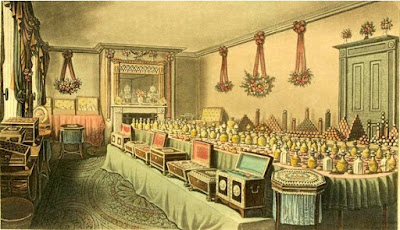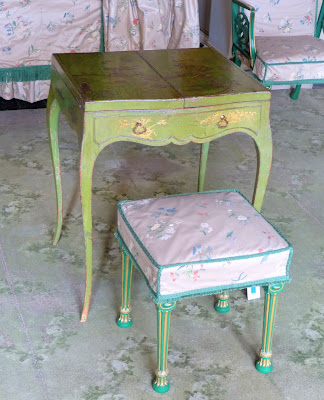 |
| Perfumery goods selected by Mr Ross of Bishopsgate on behalf of the East India Company as gifts to the Emperor of China from Ackermann's Repository (Dec 1816) |
What was Olympian Dew?“Even though she was past the bloom of youth, Mrs Westlake was still a very fine-looking woman. She had maintained her figure into middle age and her face was remarkably free of wrinkles, thanks, she believed, to the Olympian Dew which she religiously applied every day. Her hair was as thick and golden as it had been in her heyday without the slightest hint of grey. She wore it fashionably powdered and carefully arranged into a style ‘au naturel’ that her fashion arbiter, the Duchess of Devonshire, had lately adopted.” (1)
Olympian Dew was a Georgian super-cosmetic that claimed to cure all manner of skin problems. I have not been able to find out what was in it, but it was probably based on rosewater. According to an advert in The Times in 1786:
“Olympian Dew, or Grecian Bloom Water, is the only really useful and elegant composition for washing the Skin; it renders the complexion clear and beautiful; tan, redness, and every spot, freckle, wrinkle, or defect, it removes, and gives the countenance that beautiful jene quoit, so truly delightful and highly pleasing—‘No Perfume so sweet, so delicate, or refreshing, as Olympian Dew,’ says her Majesty of France.” (2)
There does not seem to be a translation for ‘jene quoit’. Maybe the ‘jene’ is supposed to read ‘jeune’ but I cannot make out what the ‘quoit’ is supposed to say; perhaps the whole means something like ‘youthful look’. Alternatively, maybe it should read ‘je ne sais quoi’ – referring to that indefinable quality that no doubt the advertisement is trying to allude to.
Olympian Dew in popular verse
 |
| The basis of Olympian Dew was probably rosewater |
Olympian Dew was so popular that it made its way into several contemporary poems.
In his poem, The Newspaper (1785), Reverend George Crabbe wrote:
“Come, faded belles, who would your youth renew,
And learn the wonders of Olympian dew;
Restore the roses that begin to faint,
Nor think celestial washes vulgar paint;
Your former features, airs, and arts assume,
Circassian virtues, with Circassian bloom.” (3)
“Meantime, with secret care, her watchful maid
Art’s choicest treasure on the toilet laid;
Here blush’d the red, there shone the liquid blue,
The milk of roses, and Olympian dew;” (4)
“That age decays is nature’s doom:
But art can mysteries unfold;
Olympian dew, Circassian bloom;
And happy woman ne’er is old.” (5)
 |
| Lady's dressing table and stool, Nostell Priory |
In his poem, The Village Curate (1788), Reverend James Hurdis was more scathing about the claims of Olympian Dew and warned his readers not to rely on it to renew their youth:
“Nor let the sweetest blossom nature boasts
Be thus expos’d to night’s unkindly damp.
Well may it droop, and all its freshness lose,
Compell’d to taste the rank and pois’nous steam
Of midnight theatre, and morning ball.
Give to repose the solemn hour she claims,
And from the forehead of the morning steal
The sweet occasion. O there is a charm
Which morning has, that gives the brow of age
A smack of youth, and makes the lip of youth
Shed perfumes exquisite. Expect it not,
Ye who till noon upon a down-bed lie,
Indulging fev’rous sleep, or wakeful dream
Of happiness no mortal heart has felt
But in the regions of romance. Ye fair,
Like you must be woo’d, or never won:
And, being lost, it is in vain ye ask
For milk of roses and Olympian dew.
Cosmetic art no tincture can afford
The faded feature to restore: no chain,
Be it of gold, and strong as adamant,
Can fetter beauty to the fair one’s will.” (6)
According to an advert in The Times in 1788, Olympian Dew could be purchased from Sharp, perfumer to His Royal Highness the Prince of Wales, who traded from 131, Fleet Street and 57, Cornhill, London. The advert claimed:
“OLYMPIAN DEW; or, GRECIAN BLOOM WATER – for washing the Skin; being the only thing in Nature that will effectually take away Freckles, Redness, Tan, Pimples, &c. making the Complexion elegantly Fair, and delicately Beautiful. No Article yet discovered is so healthy, sweet or refreshing. Young Ladies who wish to insure themselves a fair Complexion will succeed by the assistance of Olympian Dew. Those farther advanced in Life, will be pleased to find its influence make wrinkles disappear; the softness of Youth return, and lovely Vivacity sparkle in the Eye. As a Perfume, it is the most fragrant and pleasing of any—proved by an Observation of the Queen of France, at Versailles, about five Years ago—‘No Perfume so sweet, so fragrant, or refreshing, as Olympian Dew,’—was Her Majesty’s expression.” (7)
 |
| Mary Wollstonecraft from Memoirs of the Author of a Vindication of the Rights of Woman by W Godwin (1798) |
In 1787, Mary Wollstonecraft published her Thoughts on the Education of Daughters, with Reflections on Female Conduct, in the More Important Duties of Life. One of the chapters in her book addressed the question of dress. She wrote:
“Many able pens have dwelt on the peculiar foibles of our sex. We have been equally desired to avoid the two extremes in dress, and the necessity of cleanliness has been insisted on, ‘As from the body’s purity the mind receives a sympathetic aid.’ By far too much of a girl’s time is taken up in dress.”
She went on to say:
“In the article of dress may be included the whole tribe of beauty-washes, cosmetics, Olympian dew, oriental herbs, liquid bloom, and the paint which enlivened Ninon’s face, and bid defiance to time. These numerous and essential articles are advertised in so ridiculous a style, that the rapid sale of them is a very severe reflection on the understanding of those females who encourage it. The dew and herbs, I imagine, are very harmless, but I do not know whether the same may be said of the paint.” (8)
I can’t help but feel that this is, perhaps, an accurate assumption about the understanding of Mrs Westlake!
Notes
(1) From A Perfect Match by Rachel Knowles (2015).
(2) From "Universal Register." Times [London, England] 16 May 1786: 3. The Times Digital Archive. Web. 6 Oct. 2015.
(3) From Crabbe, Rev George, The Poetical Works of the Rev George Crabbe with his letters and journals and his life by his son 2/8 (1834)
(4) From Hoole, Rev Samuel, Poems: consisting of Modern Manners, Aurelia, The Curate, and other pieces never before published 2/2 (1790)
(5) From Daye, Eliza, Poems on various subjects (1798)
(6) Hurdis, Rev James, Poems 1/3 (1808)
(7) From "To The Ladies. Sharp." Times [London, England] 12 Apr. 1788: 2. The Times Digital Archive. Web. 24 Jan. 2015.
(8) From Wollstonecraft, Mary, Thoughts on the education of daughters with reflections on female conduct in the more important duties of life (1787)
Sources used include:
Crabbe, Rev George, The Poetical Works of the Rev George Crabbe with his letters and journals and his life by his son 2/8 (1834)
Daye, Eliza, Poems on various subjects (1798)
Hoole, Rev Samuel, Poems: consisting of Modern Manners, Aurelia, The Curate, and other pieces never before published 2/2 (1790)
Hurdis, Rev James, Poems 1/3 (1808)
Knowles, Rachel, A Perfect Match (2015).
Wollstonecraft, Mary, Thoughts on the education of daughters with reflections on female conduct in the more important duties of life (1787)
Times Digital Archive as cited in notes above.
All photos © RegencyHistory.net

I wonder if the names Grecian and Olympian are a clue that the roses or possibly attar of roses used in these lotions came from the area of Isparta, south of the Turkish Mount Olympus. Rose crops have always been grown there for perfume etc. The woman who gather the petals have beautiful unwrinkled skin even in old age.
ReplyDeleteWhat a lovely idea. I'm afraid I don't know, but it certainly sounds plausible.
Delete"and gives the countenance that beautiful jene quoit"
ReplyDeleteJene quoit seems like a slang contraction of "je ne sais quois," which you've probably heard before to refer to an unspeakable something special.